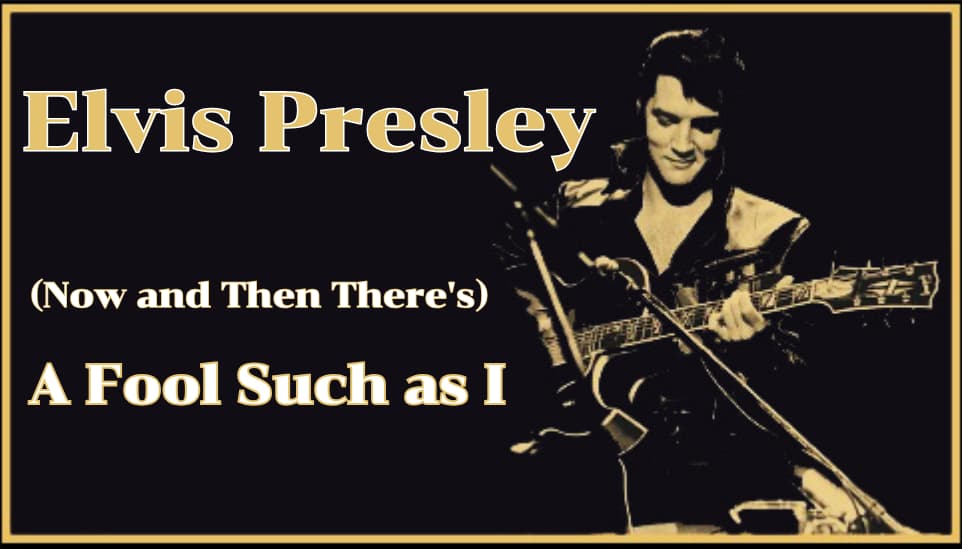
A Timeless Lament: The Enduring Echo of Unrequited Love
Ah, to cast our minds back to a time when melodies truly stirred the soul and lingered long after the final note faded. We’re talking about an era where a simple tune could encapsulate the complexities of the human heart, an era epitomized by a song that, even decades later, still resonates with a poignant beauty. Today, our focus turns to a classic that, for many, serves as a bittersweet soundtrack to memories of youthful folly and the enduring ache of love unreturned: “(Now and Then There’s) A Fool Such as I.”
This isn’t merely a song; it’s a profound declaration of vulnerability, a heartfelt confession of devotion in the face of indifference. Penned by the talented Bill Trader, “(Now and Then There’s) A Fool Such as I” first graced the airwaves in 1952. While it saw respectable success with several artists in its initial release year, including Hank Snow, who took it to No. 1 on the Billboard Country & Western Best Seller chart, and Jo Stafford, who achieved a Top 10 pop hit, it was a later rendition that truly etched it into the annals of musical history and the hearts of millions.
Fast forward to 1959, and the world was captivated by the unparalleled charisma and vocal prowess of a young man from Mississippi who would forever change the landscape of popular music. I am, of course, speaking of the one and only Elvis Presley. His rendition of “(Now and Then There’s) A Fool Such as I” became a global phenomenon, soaring to the top of the charts not only in the United States, where it reached No. 2 on the Billboard Hot 100, but also dominating in the United Kingdom, where it proudly claimed the No. 1 spot. This incredible success further solidified Elvis‘s reign as the King of Rock and Roll and showcased his remarkable ability to imbue any song with an emotional depth that was uniquely his own. The track was notably released as a double A-side single alongside “I Need Your Love Tonight,” further amplifying its widespread appeal. It also found a home on various Elvis Presley albums throughout the years, including compilation albums that served as testaments to his enduring legacy.
The story behind this particular song for Elvis is less about a dramatic personal narrative and more about his extraordinary talent for interpretation. By 1959, Elvis was already a global superstar, and his choice to record a song like “(Now and Then There’s) A Fool Such as I” demonstrated his versatility beyond the raw energy of his earlier rock and roll hits. It allowed him to showcase the softer, more melancholic side of his vocal range, proving that he was more than just a hip-swiveling sensation; he was a nuanced artist capable of conveying profound emotion. He recorded it during a session that also produced other iconic tracks, further highlighting the prolific period of his career.
But what truly gives “(Now and Then There’s) A Fool Such as I” its enduring power? It lies in its universal theme: the experience of loving someone wholeheartedly, even when that love is not fully reciprocated. The lyrics speak to that familiar, almost maddening devotion, where logic takes a backseat to an overwhelming affection. “Now and then there’s a fool such as I,” the singer laments, acknowledging the apparent absurdity of his unwavering commitment to someone who may not appreciate it. It’s a confession of being utterly smitten, so much so that he’s willing to overlook flaws, endure neglect, and even sacrifice his own pride for the sake of the beloved.
For many of us who have lived a few decades, this song serves as a tender reminder of those early heartaches, those first profound loves where the world seemed to revolve around one person. We’ve all, at some point, been that “fool,” pouring our hearts out, perhaps foolishly, perhaps bravely, to someone who simply wasn’t on the same page. The song doesn’t judge this foolishness; rather, it embraces it with a gentle understanding, recognizing it as an inherent part of the human condition. It speaks to the courage it takes to open oneself up to love, even with the inherent risk of pain.
The beauty of Elvis‘s rendition lies in his delivery. His voice, often powerful and commanding, here takes on a tender, almost resigned quality. You can almost hear the sigh in his voice, the quiet acceptance of his emotional state. It’s a performance that transcends mere singing; it’s storytelling through melody, an intimate sharing of a very personal sentiment. The subtle instrumentation, particularly the gentle rhythm and the harmonious backing vocals, further enhance the song’s melancholic yet comforting embrace.
So, as we listen to “(Now and Then There’s) A Fool Such as I” once more, perhaps in the quiet of an afternoon, let us not only appreciate its musical brilliance but also reflect on our own journeys through love and loss. Let it be a gentle reminder of the resilience of the human heart and the enduring, sometimes foolish, yet always beautiful, pursuit of connection. It’s a timeless melody that assures us we are never truly alone in our capacity for love, even when it feels unrequited.